Related Research Articles

The Ulster Unionist Party (UUP) is a unionist political party in Northern Ireland. The party was founded in 1905, emerging from the Irish Unionist Alliance in Ulster. Under Edward Carson, it led unionist opposition to the Irish Home Rule movement. Following the partition of Ireland, it was the governing party of Northern Ireland between 1921 and 1972. It was supported by most unionist voters throughout the conflict known as the Troubles, during which time it was often referred to as the Official Unionist Party (OUP).

Northern Ireland is one of the four countries of the United Kingdom,, situated in the north-east of the island of Ireland. It was created as a separate legal entity on 3 May 1921, under the Government of Ireland Act 1920. The new autonomous Northern Ireland was formed from six of the nine counties of Ulster: four counties with unionist majorities – Antrim, Armagh, Down, and Londonderry – and two counties with slight Irish nationalist majorities – Fermanagh and Tyrone – in the 1918 General Election. The remaining three Ulster counties with larger nationalist majorities were not included. In large part unionists, at least in the north-east, supported its creation while nationalists were opposed.

The Democratic Unionist Party (DUP) is a unionist and loyalist political party in Northern Ireland. It was founded in 1971 during the Troubles by Ian Paisley, who led the party for the next 37 years. Currently led by Jeffrey Donaldson, it is the second largest party in the Northern Ireland Assembly, and is the fifth-largest party in the House of Commons of the United Kingdom. The party has been described as right-wing and socially conservative, being anti-abortion and opposing same-sex marriage. The DUP sees itself as defending Britishness and Ulster Protestant culture against Irish nationalism; the party is Eurosceptic and supported Brexit.
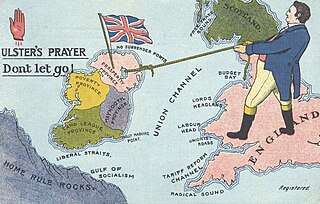
Unionism is a political tradition on the island of Ireland that favours political union with Great Britain and professes loyalty to the British Crown and constitution. As the overwhelming sentiment of Ireland's Protestant minority, following Catholic Emancipation (1829) unionism mobilised to keep Ireland part of the United Kingdom and to defeat the efforts of Irish nationalists to restore a separate Irish parliament. Since Partition (1921), as Ulster Unionism its goal has been to maintain Northern Ireland as part of the United Kingdom and to resist a transfer of sovereignty to an all-Ireland republic. Within the framework of a 1998 peace settlement, unionists in Northern Ireland have had to accommodate Irish nationalists in a devolved government, while continuing to rely on the link with Britain to secure their cultural and economic interests.
The Alliance Party of Northern Ireland (APNI), or simply Alliance, is a liberal and centrist political party in Northern Ireland. As of the 2022 Northern Ireland Assembly election, it is the third-largest party in the Northern Ireland Assembly, holding seventeen seats, and has made recent breakthroughs to place third in first preference votes in the 2019 European Parliament election and third highest-polling regionally at the 2019 UK general election. The party won one of the three Northern Ireland seats in the European Parliament, and one seat, North Down, in the House of Commons, the lower house of the Parliament of the United Kingdom.
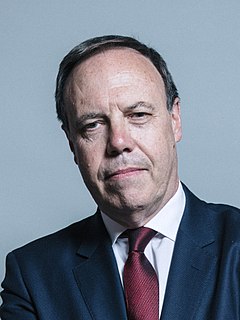
Nigel Alexander Dodds, Baron Dodds of Duncairn,, is a British unionist politician who has been the Leader of the Democratic Unionist Party (DUP) in the House of Lords since 2021, and was the deputy leader of the DUP from 2008 to 2021.
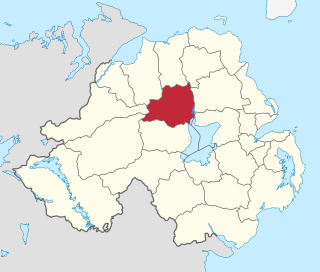
Magherafelt District Council was a district council in County Londonderry in Northern Ireland. It was merged with Cookstown District Council and Dungannon and South Tyrone Borough Council on 1 April 2015 under local government reorganisation in Northern Ireland becoming Mid-Ulster District Council.

Robert Thomas William McCrea, Baron McCrea of Magherafelt and Cookstown is a retired Free Presbyterian minister from Northern Ireland. A former Democratic Unionist Party (DUP) politician, he represented South Antrim and Mid Ulster as their Member of Parliament (MP), representing Mid Ulster from 1983 to 1997; then South Antrim between 2000 to 2001, and then again from 2005 to 2015.

The Vanguard Unionist Progressive Party (VUPP), informally known as Ulster Vanguard, was a unionist political party which existed in Northern Ireland between 1972 and 1978. Led by William Craig, the party emerged from a split in the Ulster Unionist Party (UUP) and was closely affiliated with several loyalist paramilitary groups. The party was set up in opposition to power sharing with Irish nationalist parties. It opposed the Sunningdale Agreement and was involved in extra-parliamentary activity against the agreement. However, in 1975, during discussions on the constitutional status of Northern Ireland in the constitutional convention, William Craig suggested the possibility of voluntary power sharing with the nationalist Social Democratic and Labour Party. In consequence the party split, with dissenters forming the United Ulster Unionist Party. Thereafter Vanguard declined and following poor results in the 1977 local government elections, Craig merged the remainder of Vanguard into the UUP in February 1978.

Fermanagh District Council was a local council in Northern Ireland. It was created out of Fermanagh County Council and later merged with Omagh District Council in April 2015 under local government reorganisation to become Fermanagh and Omagh District Council.
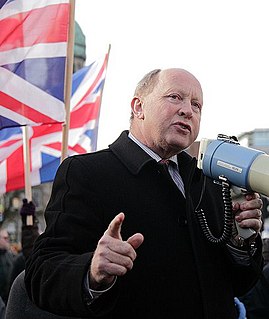
James Hugh Allister is a British Unionist politician and barrister in Northern Ireland. He founded the Traditional Unionist Voice (TUV) political party in 2007, leading the party since its formation. Allister has served as a Member of the Northern Ireland Assembly (MLA) for North Antrim since 2011, and is the TUV’s only representative in the Assembly.

Mid Ulster is a parliamentary constituency in the UK House of Commons. The current MP is Francie Molloy of Sinn Féin.

Peter Weir is a Democratic Unionist Party (DUP) politician who served as Minister for Education in the Northern Ireland Executive from 2016 to 2017 and from 2020 to 2021. Weir was the first non-Sinn Féin legislator to head the Department of Education since the department came into existence on 2 December 1999.

Armagh City and District Council was a district council in County Armagh in Northern Ireland. It merged with Banbridge District Council and Craigavon Borough Council in May 2015 under local government reorganisation in Northern Ireland to become Armagh, Banbridge and Craigavon District Council.
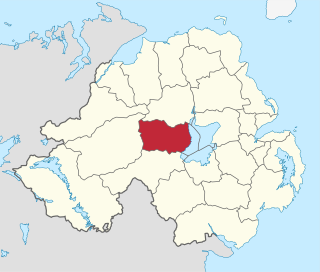
Cookstown District Council was a district council covering an area largely in County Tyrone and partly in County Londonderry. It merged with Dungannon and South Tyrone Borough Council and Magherafelt District Council in May 2015 under local government reorganisation in Northern Ireland to become Mid-Ulster District Council.
Danny O'Connor is an Irish former Social Democratic and Labour Party (SDLP) politician who was a Member of the Northern Ireland Assembly (MLA) for East Antrim from 1998 to 2003. He was also a member of Larne Borough Council from 1997 to 2011.

Since 1998, Northern Ireland has devolved government within the United Kingdom. The government and Parliament of the United Kingdom are responsible for reserved and excepted matters. Reserved matters are a list of policy areas, which the Westminster Parliament may devolve to the Northern Ireland Assembly at some time in future. Excepted matters are never expected to be considered for devolution. On all other matters, the Northern Ireland Executive together with the 90-member Northern Ireland Assembly may legislate and govern for Northern Ireland. Additionally, devolution in Northern Ireland is dependent upon participation by members of the Northern Ireland Executive in the North/South Ministerial Council, which co-ordinates areas of co-operation between Northern Ireland and the Republic of Ireland.
Walter Millar is a unionist politician in Northern Ireland.
Patrick Aloysius Duffy, known as Paddy Duffy, was an Irish nationalist politician.
References
- ↑ "From Irish Political Review – July Editorial Commentary". Archived from the original on 12 October 2007. Retrieved 21 September 2007.
- ↑ ::: u.tv :::
- ↑ "Barrister Profile: Alan Kane QC". Bar of Northern Ireland. Archived from the original on 11 May 2021. Retrieved 11 May 2021.
- ↑ NI Assembly, 15 November 1983, vol 7, p914
- ↑ NI Assembly, 7 December 1982, vol 4, p338
- ↑ NI Assembly, 28 May 1985, vol 15, p397